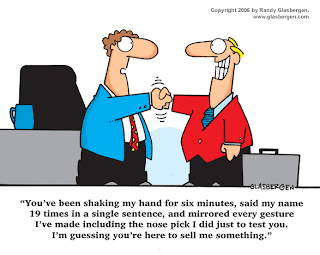Long before Social Media Videos, television and the movies were our best source for information on sales. Nowadays, you can gain access to videos that make us learn, think or laugh at the sale profession. Amazingly, it was only a few years ago that this video had an entirely different meaning than it does today:
So you still think social media is a fad? You may think twice after taking at look at this video and the startling statistics. With 1.5 million views since posting on You Tube May 2010, the data is already outdated. Its predeceasor with 2.8 views was less than a year old from July 2009 when it had to be updated.
One of my favorite catches was how social media impacts sales: "listen first, sell second". That isn't far off from what most sales pros know and rookies always hear. Now, social media forces you to listen, otherwise you will be labeled as "spam" , blocked and forever lost. Wouldn't a spam label be nice to have on our caller IDs during dinner by telemarketers? What is interesting is the challenge to be more clever in less time across more channels while attention is fleeting and today's news is now mere minutes ago.
Do you want to sell something?
You may want to seriously consider whether or not videos or social media should be an important part of your marketing or sales plan. Since Old Spice's commercial's original launch in 2006, it has is the most successful viral campaign. Recognized as the #1 Viewed (26 million) and Uploaded (210 million) it has caused mini-revolution with amost 273,000 subscribers. I would have loved to have been a fly on the wall in the boardroom when the idea first pitched.
How about learning?
By just plugging in this search can learn just about anything. From the #1 dog training tips (17.5 million views) how to do crunches for 6-pack abs (17 million views) to how to play Guitar Hero (8 million views).
I've shown Glenngarry Glen Ross to sales teams on more than one occasion to create dialogue on selling. It also showcases the different characters on a sales team from the top salesperson, to the rep who relies mainly on leads, to the narcicist Alec Baldwin character.
The following is my favorate of late. This scene gives a great example that in sales, it isn't always the questions being asked, but how they are comminicated. There is also the forgotten art of the "pause" sales technique that is classic.
There are a multitude of great sales training videos on You Tube. However, call me lazy ... or smart. My favorite website to watch sales videos is www.bnet.com. After all, they've taken the time to surf or provide many great ones so that I don't have to. Oh, and if you haven't figure it out already ...... the best, funniest, greatest of anything tends to be NOT!
Not convinced yet whether social media will help or hamper your sales efforts? Here is one last look at what sharing has come to:

So you still think social media is a fad? You may think twice after taking at look at this video and the startling statistics. With 1.5 million views since posting on You Tube May 2010, the data is already outdated. Its predeceasor with 2.8 views was less than a year old from July 2009 when it had to be updated.
One of my favorite catches was how social media impacts sales: "listen first, sell second". That isn't far off from what most sales pros know and rookies always hear. Now, social media forces you to listen, otherwise you will be labeled as "spam" , blocked and forever lost. Wouldn't a spam label be nice to have on our caller IDs during dinner by telemarketers? What is interesting is the challenge to be more clever in less time across more channels while attention is fleeting and today's news is now mere minutes ago.
Do you want to sell something?
You may want to seriously consider whether or not videos or social media should be an important part of your marketing or sales plan. Since Old Spice's commercial's original launch in 2006, it has is the most successful viral campaign. Recognized as the #1 Viewed (26 million) and Uploaded (210 million) it has caused mini-revolution with amost 273,000 subscribers. I would have loved to have been a fly on the wall in the boardroom when the idea first pitched.
How about learning?
By just plugging in this search can learn just about anything. From the #1 dog training tips (17.5 million views) how to do crunches for 6-pack abs (17 million views) to how to play Guitar Hero (8 million views).
I've shown Glenngarry Glen Ross to sales teams on more than one occasion to create dialogue on selling. It also showcases the different characters on a sales team from the top salesperson, to the rep who relies mainly on leads, to the narcicist Alec Baldwin character.
The following is my favorate of late. This scene gives a great example that in sales, it isn't always the questions being asked, but how they are comminicated. There is also the forgotten art of the "pause" sales technique that is classic.
There are a multitude of great sales training videos on You Tube. However, call me lazy ... or smart. My favorite website to watch sales videos is www.bnet.com. After all, they've taken the time to surf or provide many great ones so that I don't have to. Oh, and if you haven't figure it out already ...... the best, funniest, greatest of anything tends to be NOT!
Not convinced yet whether social media will help or hamper your sales efforts? Here is one last look at what sharing has come to:




